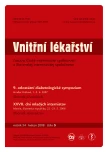Examination of the kidneys in a diabetic patient
Authors:
V. Tesař
Authors‘ workplace:
Klinika nefrologie 1. lékařské fakulty UK a VFN Praha, přednosta prof. MUDr. Vladimír Tesař, DrSc.
Published in:
Vnitř Lék 2008; 54(5): 494-498
Category:
Overview
Diabetic nephropathy is the most frequent cause of terminal renal failure in the Czech Republic today. Diabetic patients should be screened for diabetic kidney disease on an annual basis, starting 5 years after diabetes was diagnosed in type 1 diabetes patients and immediately after diagnosis in type 2 diabetes patients. The screening includes determining the albumin/creatinine ratio from a urine sample, and of serum creatinine, and the calculation of glomerular filtration rate. In patients in whom microalbuminuria and/or proteinuria were found, measures should be taken to reduce cardiovascular risk and to slow down the progression of renal disease. In diabetic patients with abnormal urine test results detailed nephrology examination is necessary to exclude other renal diseases than diabetic nephropathy, especially chronic glomerulonephritis and ischaemic nephropathy.
Key words:
diabetes mellitus – diabetic nephropathy – albuminuria – proteinuria – albumin/creatinine ratio
Sources
1. American Diabetes Association: Clinical Practice Recommendations 2005. Diabetes Care 2005; 28(Suppl 1): S1-S79.
2. Basi S, Lewis JB. Microalbuminuria as a target to improve cardiovascular and renal outcomes. Am J Kidney Dis 2006; 47 : 927-946.
3. Costacou T, Ellis D, Fried L et al. Sequence of progression of albuminuria and decreased GFR in persons with type 1 diabetes: a cohort study. Am J Kidney Dis 2007; 50 : 721-732.
4. K/DOQI clinical practice guidelines for chronic kidney disease: evaluation, classification, and stratification. Am J Kidney Dis 2002; 39(Suppl 1): S1-S266.
5. K/DOQI clinical practice guidelines for management of dyslipidemias in patients with kidney disease. Am J Kidney Dis 2003; 41(Suppl 3): S1-S91.
6. K/DOQI clinical practice guidelines for cardiovascular disease in dialysis patients. Am J Kidney Dis 2005; 45(Suppl 3): S1-S153.
7. KDOQI Clinical Practice Guidelines and Clinical Practice Recommendations for Diabetes and Chronic Kidney Disease. Am J Kidney Dis 2007; 49(Suppl 2): S1-S154.
8. Levey AS, Bosch JP, Lewis JB et al. A more accurate method to estimate glomerular filtration rate from serum creatinine: a new prediction equation. Modification of Diet in Renal Disease Study Group. Ann Intern Med 1999; 130 : 461-470.
9. MacIsaac RJ, Tsalamandris C, Panagiotopoulos S et al. Nonalbuminuric renal insufficiency in type 2 diabetes. Diabetes Care 2004; 27 : 195-200.
10. Pham TT, Sim JJ, Kujubu DA et al. Prevalence of nondiabetic renal disease in diabetic patients. Am J Nephrol 2007; 27 : 322-328.
11. Rigalleau V, Lasseur C, Raffaitin C et al. Normoalbuminuric renal-insufficient diabetic patients: a lower-risk group. Diabetes Care 2007; 30 : 2034-2039.
12. Ruggenenti P, Remuzzi G. Time to abandon microalbuminuria. Kidney Int 2006; 70 : 1214-1222.
13. Vora JP et al. Clinical manifestations and natural history of diabetic nephropathy. In: Johnson RJ, Feehally J. Comprehensive clinical nephrology. London: Mosby 2000 : 34.1.-34.12.
Labels
Diabetology Endocrinology Internal medicineArticle was published in
Internal Medicine

2008 Issue 5
-
All articles in this issue
- Haemocoagulation and renal insufficiency, haemocoagulation and type 2 diabetes mellitus
- Urologic surgery in diabetes
- Tumours of kidneys, urinary bladder and prostate in obesity and diabetes
- Bariatric surgery and the kidneys
- System rennin-aldosterone in fat tissue and other organ and tissues
- Diabetes, dyslipidaemia and kidney diseases
- Specific issues of dialysed diabetics in outpatient practice
- Specific aspects of peritoneal dialysis in diabetic patients
- Education of diabetic patients with chronic kidney disease and after transplantation
- Metformin and kidneys
- The use of organ specific substrates in kidney disease in a diabetic patient
- Nutrition for the diabetic patient with kidney disease
- Mucosal immunity with emphasise on urinary tract immunity and diabetes
- Visceral diabetic neuropathy of the urogenital tract
- Erectile dysfunction, its relation to diabetes and its management in 2007
- Epidemiology of diabetic nephropathy
- Examination of the kidneys in a diabetic patient
- Diabetes mellitus, hypertension and kidney
- Internal Medicine
- Journal archive
- Current issue
- Online only
- About the journal
Most read in this issue
- Metformin and kidneys
- Haemocoagulation and renal insufficiency, haemocoagulation and type 2 diabetes mellitus
- Specific issues of dialysed diabetics in outpatient practice
- Examination of the kidneys in a diabetic patient
